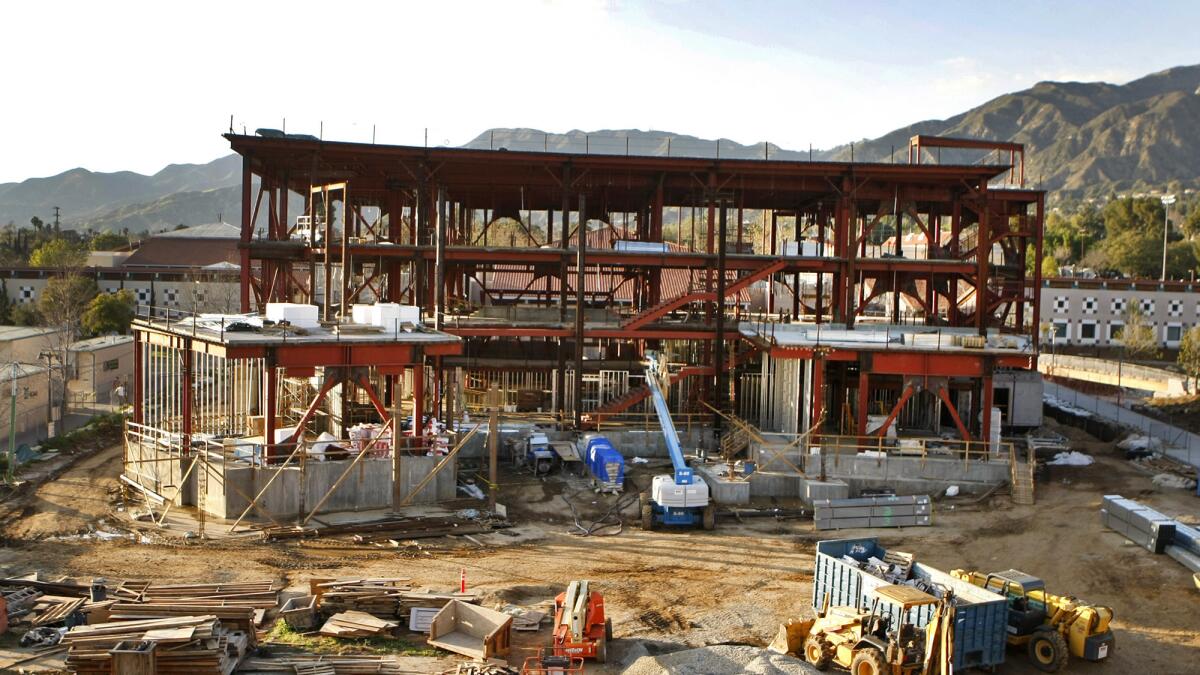With lawsuits and overspending, another L.A. Community College bond measure sparks controversy

- Share via
In 2016, the Los Angeles Community College District persuaded voters to approve a $3.3-billion construction bond measure to upgrade woefully outdated campuses at the nation’s largest two-year college system.
There would be “strict accountability” over public funds, the district vowed, saying it had cleaned up the massive financial waste, nepotism and mismanagement that plagued projects funded with previous bond measures, as The Times documented in 2011.
But the implementation of the latest bond has already sparked controversy, with lawsuits, political infighting and missed performance targets.
The manager of the bond program, Jacobs Project Management Co., has overspent its first-year budget by $1.8 million. The company won the five-year, $85.9-million contract from the district in 2017 after a process that was so hotly contested that the losing bidder is challenging it in court.
David Salazar, the district’s chief facilities executive, recently told trustees that the overspending did not reflect sound business practices and that Jacobs officials needed to present a plan to correct it.
Steven J. Demetriou, president of parent company, Jacobs Engineering Group Inc., did not respond to an interview request from The Times. But in a written response to an independent audit presented last month, Jacobs officials pledged to correct the problems.
On Monday, the company met with district officials to nail down a plan. The full Board of Trustees will review the audit, conducted by KPMG LLP, at its meeting Wednesday at Los Angeles Pierce College.
According to the audit, Jacobs failed to deliver on services, including written plans on how the company planned to manage the bond program and a website for it. The audit also found that Jacobs hasn’t developed an adequate process to estimate costs, hasn’t created a centralized database to track such information and hasn’t ensured that any changes made to those cost estimates were properly authorized.
Like multiple bond measures before it, money from this most recent one is intended to pay for updating decades-old buildings, outfitting them with new technology, seismic safety improvements and installing doors and ramps that comply with the Americans With Disabilities Act.
Chancellor Francisco C. Rodriguez said last week that he remains confident that the bevy of reforms the district has adopted since 2011 would head off any additional problems with the bond measure.
“Am I concerned that we’re off to a bad start? No,” he said in an interview. “All that was addressed in the performance audit has been — or can be — remedied quickly and efficiently.”
Trustee Steve Veres said it was too soon for major worries. The contract allows the company to make up for any overspending by cutting back in subsequent years to stay within the confines of the contract. Spending might be higher in the first year, he said, because Jacobs was adding enough staff to handle an estimated $400 million in projects each year.
“If this happens next year and becomes a trend,” Veres said of the overspending, “we will need a major correction.”
But Trustee Scott Svonkin was troubled. He successfully fought to include greater oversight in the 2016 bond measure, which requires the district to commission independent performance audits and hire a company to scrutinize projects funded by the bond to detect waste, fraud and abuse.
“We can’t go back to the old days where we didn’t pay attention,” he said. “We have to be vigilant and fiscally responsible with every dime.”
The most recent bond measure has been mired in controversy from nearly the start.
In July 2017, shortly after joining the board, Veres told Rodriguez that he was concerned about “trustee ethics, potential corruption and public perception” involving Svonkin. He said he believed Svonkin was rushing the bid process to favor companies that had given him nearly $20,000 in campaign contributions just before and after the request for proposals was issued, according to an email provided to The Times by Veres.
Rodriguez told The Times that Svonkin had not rushed the bid process. Svonkin, for his part, said Friday that he did nothing wrong and that Veres also had taken money from contractors during his election campaign.
Meanwhile, the company that lost the bid, AECOM Technical Services Inc., is suing the community college district over its decision to award the contract to Jacobs. In its legal filing, AECOM argues that its initial bid was more than $15 million lower than Jacobs’ bid, but only Jacobs was allowed to revise its offer.
An attorney for AECOM argued in court last week that the district practiced illegal “favoritism,” depriving taxpayers of the best value for their dollars. The district has denied any improprieties.
In addition, a new district study has raised questions about the need for more facilities. The study, released in December, found that many classrooms, laboratories and offices on the nine campuses were unused much of the time — to a greater degree than the statewide community college average.
“I don’t believe we need to build everything that was proposed,” Svonkin said, adding that he would support upgrades to enhance campus safety.
Veres said many campuses need modern spaces for libraries, tutoring centers and new student unions. Rodriguez says the district needs an estimated $1 billion just for seismic safety, accommodations for people with disabilities, as well as basic repairs to storm systems, gas and sewer lines, leaky roofs and electrical systems.
Such upgrades are not as lucrative as constructing new buildings, causing some district officials to worry that there will be a push for splashier projects. Rodriguez, however, said stronger oversight will guard against any boondoggles.
“We will closely monitor all projects,” he pledged. “The taxpayers deserve accountability and transparency.”
Twitter: @TeresaWatanabe
More to Read
Sign up for Essential California
The most important California stories and recommendations in your inbox every morning.
You may occasionally receive promotional content from the Los Angeles Times.














